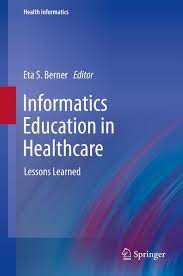Interaction Between Nurse Informaticists and Other Specialists NURS 6051
Discussion: Interaction between Nurse Informaticists and Other Specialists Example Approach

The roles of nurse informaticists and specialists are virtually applicable in all health practice settings. Their responsibilities encompass collaboration with other professionals, thus requiring appropriate collaborative strategies. Nurse informaticists support information acquisition and clinical information system evaluation and implementation. In so doing, they promote and assist the institution in knowledge management (Nagle et al., 2020).
In my practice setting, patients that do not require emergency care are received and triaged before they are directed to the appropriate specialists. The patients’ data are collected or retrieved at the triaging and reception. At this point, the entry and classification of this information to the appropriate departments require the services of nurse informaticists.
The process of admitting a patient to our institution starts with the registration. The patient’s data is entered in hard copy patient file records and into the electronic health records for easy retrieval. The physical file records are handled only by the clinicians and patients have limited access. The process of patient interview and history taking involves recording the information in the file records and transferring the summarized and organized data into the electronic records.
The results from the lab are produced in hard copy printed papers and filed while a copy is sent to the requesting physician for further interpretation and care. The nurse is responsible for collecting and transferring patient data and transmitting results between different outpatient departments. In the process, the nurse interacts with the physician and technicians on a daily basis and is responsible for the flow of the patient’s information and data throughout until discharge.
Improving the Interactions
The interaction between the nurse informaticists and the physicians is collaborative and interdependent. The process of flow and exchange of information and data between the nurses and the consultants is slower and would be improved through the use of information technology. Using information technology with paper-based methods as backup would speed up these interactions, ensuring faster, specific, patient-centered care (Nelson & Carter-Templeton, 2016).
Information technology, through electronic health records (EHR), would be used to transfer, share and inform other specialists on patient’s data results and details about their care so far. Relaying the patient’s information from the reception and registration to the consultants’ rooms would be done through electronic means to eliminate potential delays. The time the nurses take when consolidating the patient’s data from the lab to consultation rooms and wards can be reduced through electronic data transfer using computer technology. The use of technology also enhances faster and efficient data analysis that would promote effective knowledge management.
Impacts of Evolution of Nursing Informatics
Nursing informatics has evolved over the past decades from informal informatics that involved no profession to the professional learning of the nursing informatics and information technology. The evolution of nursing informatics into a specialty, together with technological advancements, has increased the scope of the application of nursing informatics.
Presently, aspiring nurse informaticists must acquire relevant knowledge of information technology. This knowledge keeps advancing with time and the technologies become more sophisticated and nurse informaticists have to update their skills and capabilities to interpret organizational information flow (Glassman, 2017) adequately.
The advancements would reduce the interaction duration between professionals and improve the quality of interaction due to the unification of interaction by the use of similar and specific technologies (Brixley, 2016). Modest outcomes include reduced documentation, faster patient registration, and reduced admission time. Specific tasks, including nursing data collection and diagnosis, will be semi-automated if not fully automated.
Interaction Between Nurse Informaticists and Other Specialists NURS 6051
Online class and exam help
Struggling with online classes or exams? Get expert help to ace your coursework, assignments, and tests stress-free!